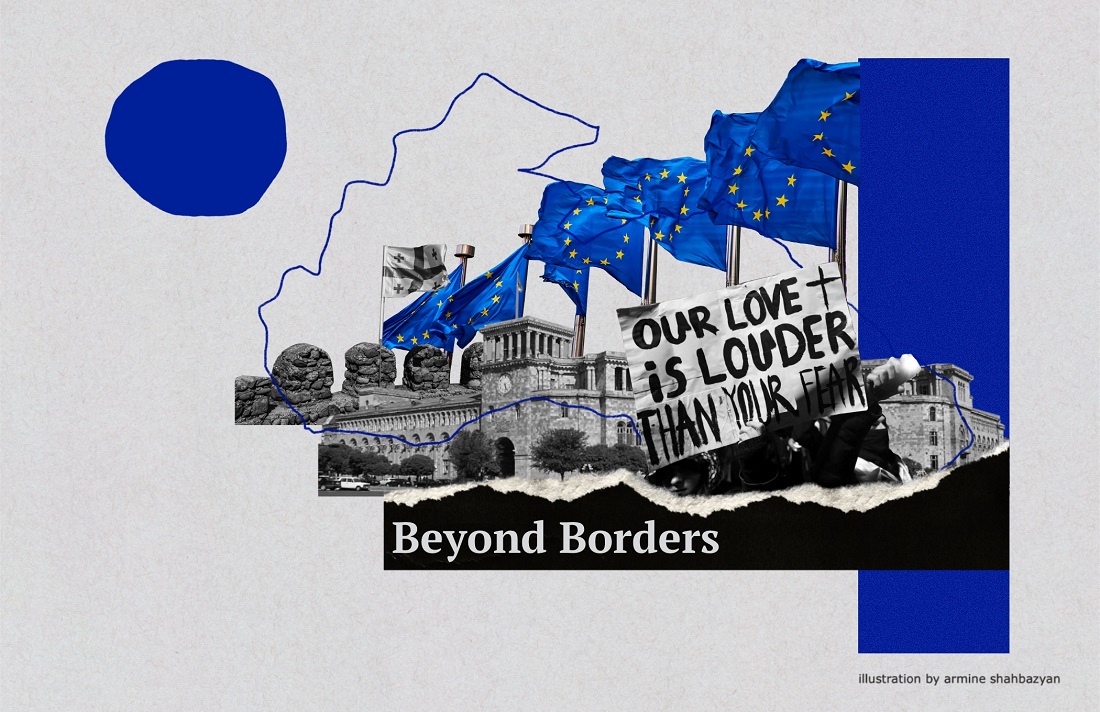[Beyond Borders]
This column explores the key issues shaping life in the South Caucasus, focusing on how the divergent paths of Georgia, Armenia and Azerbaijan reflect the region’s complex histories, economic developments, and political shifts. While new generations in these countries grow more isolated from one another due to language barriers and conflicting national trajectories, the same is true for local policymakers, who are often more familiar with distant capitals than their immediate neighbors. Each nation seeks its own path, sometimes in conflict with others, while international actors often treat the region as a whole, reluctant to craft policies specific to individual states. Drawing on personal experience with the region’s revolutions, conflicts and transformations, Olesya brings you Beyond Borders—a column exploring how decisions made in one corner of the South Caucasus impact all who live there.

Listen to the article.
Every evening, the streets of Tbilisi flood with masses of people, their numbers showing no signs of dwindling amidst the ongoing unrest. In over ten days of demonstrations, only two nights have passed without incident. Authorities have responded by dispersing crowds with unprecedented use of police force, conducting arrests, and carrying out property searches targeting individuals associated with the opposition, the protests, or both. Hundreds have gone through police detention centers with dozens still remaining hospitalized due to injuries.
The West has been slow to respond to the Georgian crisis, which began over a month ago. The opposition, civil society groups, and Western observers refused to recognize the results of the parliamentary elections, which declared Georgian Dream a confident winner. Since then, the new parliament convened, and despite procedural and legal norms—and a boycott by opposition representatives—a new government was elected.
A key announcement from Georgia’s new leadership has ignited the current wave of protests: the decision to pause the country’s integration process with the European Union. Prime Minister Irakli Kobakhidze declared that the process would be suspended until 2028, effectively sidelining Georgia during a critical window when the EU is prepared to seriously consider new members over the next five years. This decision destabilized an already fragile political landscape, triggering the largest protests in Georgia since independence nearly four decades ago.
Armenia is watching events in Georgia closely—and for good reason. As a vital neighbor, Georgia serves not only as Armenia’s primary gateway to the world but also as a barometer for stability and development in the South Caucasus. If Georgia becomes isolated from the West and fully shifts into the Russian orbit, Armenia would find itself as the sole democracy in a volatile region, surrounded by adversarial and/or authoritarian neighbors.
While developments in Georgia warrant close attention, they should not derail Armenia from its declared ambitions. Concerns about Georgia’s potential policy reversal influencing Armenia’s path—especially with Donald Trump’s recent reelection—have been raised by politicians and analysts. While these fears are not unfounded, they should not lead to rash decisions. Georgia’s own recent history demonstrates how a country can sustain and deepen cooperation with the West despite geopolitical upheavals.
Losing a Partner Is Not the End
In 2010, when Ukraine elected Viktor Yanukovych as its new president, the Georgian political elite fell into despair. Just two years after Russian tanks rolled into Georgian regions, Tbilisi understood that a pro-Russian leader in Ukraine would derail joint projects aimed at closer integration with the West. Their fears were quickly realized: Yanukovych formally abandoned cooperation with NATO, then the main integration platform for the region.
Georgia found itself isolated and could have easily retreated from its Western ambitions. Yet, it did not. Tbilisi pressed on, recognizing cooperation with the West as its best path to escape Russian influence and foster national development. The European Union’s Eastern Partnership initiative provided an essential framework, helping Georgia advance despite Ukraine’s temporary U-turn. By the time Ukraine rejoined the integration process, Georgia was already a pioneer.
Armenia’s situation with Georgia is distinct but not entirely different. While both countries are part of the Eastern Partnership, they are on separate tracks: Georgia is part of the integration trio with Moldova and Ukraine. In this sense, Armenia is not directly tethered to Georgia’s progress. Nevertheless, the lesson is clear: progress is possible even when regional dynamics shift or partnerships falter. Ultimately, it depends on a nation’s determination.
Does Geography Matter?
Last year, when the European Union debated granting Georgia candidate status, Armenia actively championed its neighbor’s cause. Senior Armenian officials and delegations advocated for Georgia in European capitals, recognizing that their neighbor’s success could bolster Armenia’s own aspirations for EU integration.
For the EU, geography plays a significant role. Many integration programs are tailored around proximity, facilitating travel and trade. During Georgia’s early integration efforts, concerns about its lack of a direct land border with the EU surfaced. Georgia countered these concerns by highlighting its Black Sea coastline, redefining its role in regional connectivity and expanding the vision of trans-regional integration.
While Georgia continues on its EU trajectory, Armenia could theoretically advocate for the regional benefits of shared progress. However, the realities of EU integration remain firmly anchored in bilateral agreements. Armenia’s advancement will hinge on its own reforms and direct negotiations with EU institutions. While a supportive neighbor can offer strategic advantages, Armenia’s path to EU integration will depend on the strength of its individual efforts rather than proximity or regional spillover effects.
It Is All Up to You
Georgia’s EU crisis will undoubtedly leave its mark. Decades of investment in Western integration may instill caution in pursuing new challenges. However, Armenia’s success will hinge on how effectively it articulates its ambitions and draws actionable lessons from Georgia’s experience to strengthen its relationship with Brussels.
Consider the recent example of Armenia’s visa liberalization dialogue with the EU, initiated in September. After years of advocacy, Armenia has secured prospects for visa-free travel to EU member states. Notably, some EU officials expedited this dialogue to preempt possible fallout from Georgian elections, where discussions about suspending Georgia’s visa-free travel emerged. By acting decisively, both Armenia and the EU achieved a shared goal, demonstrating how cooperation can yield tangible benefits.
Georgia did not achieve its EU candidate status overnight. For over 15 years, it underwent profound institutional reforms, becoming more stable, economically attractive, and democratically resilient. Today, even amid protests, Georgia’s democracy enables thousands to take to the streets without collapsing under the strain.
For Armenia, deeper EU cooperation promises significant rewards: substantial funding for infrastructure and development projects, enhanced political stability, and a protective diplomatic framework vital for a nation grappling with post-war challenges and border insecurities. But Armenia’s leadership must heed the Georgian example: fostering consensus across society, including dissenters, is critical. Ignoring domestic critics risks sowing discontent that could paralyze political progress.
The Armenian government and opposition alike should recognize the transformative potential of EU-led reforms. For the ruling elite, reforms promise enhanced governance and international legitimacy. For the opposition, they offer expanded political space and genuine opportunities for power transitions. Georgia’s history demonstrates how robust democratic mechanisms can compel even entrenched leaders, like Mikheil Saakashvili in 2012, to cede power peacefully.
The choice before Armenia is clear. Closer ties with the European Union can catalyze democratic growth and economic development while strengthening the country’s position in a precarious region. Yet success hinges on commitment—from politicians, civil society, and the broader public—to persist through challenges and embrace the opportunities ahead.


